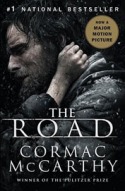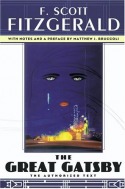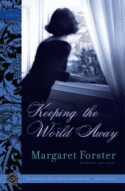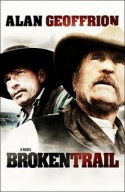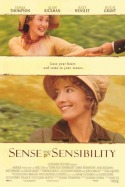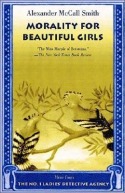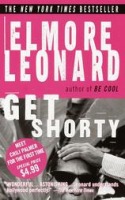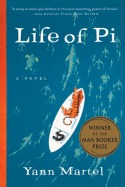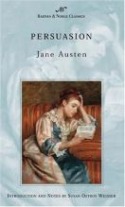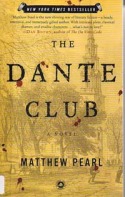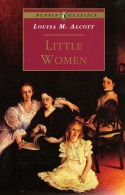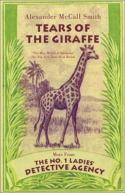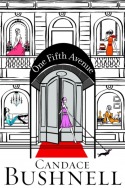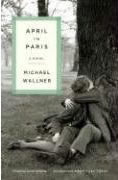Nelly Dean's Used Books
More Fiction
More books to love! For shipping rates and information, please see the "Fiction" page.
Remember - get combined shipping with the purchase of 3 or more books and PAY NO SHIPPING if you arrange local pickup!
Remember - get combined shipping with the purchase of 3 or more books and PAY NO SHIPPING if you arrange local pickup!

The Yiddish Policeman's Union
by Michael Chabon
From Publishers Weekly
They are the "frozen Chosen," two million people living, dying and kvetching in Sitka, Alaska, the temporary homeland established for displaced World War II Jews in Chabon's ambitious and entertaining new novel. It is—deep breath now—a murder-mystery speculative-history Jewish-identity noir chess thriller, so perhaps it's no surprise that, in the back half of the book, the moving parts become unwieldy; Chabon is juggling narrative chainsaws here.The novel begins—the same way that Philip Roth launched The Plot Against America—with a fascinating historical footnote: what if, as Franklin Roosevelt proposed on the eve of World War II, a temporary Jewish settlement had been established on the Alaska panhandle? Roosevelt's plan went nowhere, but Chabon runs the idea into the present, back-loading his tale with a haunting history. Israel failed to get a foothold in the Middle East, and since the Sitka solution was only temporary, Alaskan Jews are about to lose their cold homeland. The book's timeless refrain: "It's a strange time to be a Jew."Into this world arrives Chabon's Chandler-ready hero, Meyer Landsman, a drunken rogue cop who wakes in a flophouse to find that one of his neighbors has been murdered. With his half-Tlingit, half-Jewish partner and his sexy-tough boss, who happens also to be his ex-wife, Landsman investigates a fascinating underworld of Orthodox black-hat gangs and crime-lord rabbis. Chabon's "Alyeska" is an act of fearless imagination, more evidence of the soaring talent of his previous genre-blender, the Pulitzer Prize–winning The Amazing Adventures of Kavalier and Clay.Eventually, however, Chabon's homage to noir feels heavy-handed, with too many scenes of snappy tough-guy banter and too much of the kind of elaborate thriller plotting that requires long explanations and offscreen conspiracies.Chabon can certainly write noir—or whatever else he wants; his recent Sherlock Holmes novel, The Final Solution, was lovely, even if the New York Times Book Review sniffed its surprise that the mystery novel would "appeal to the real writer." Should any other snobs mistake Chabon for anything less than a real writer, this book offers new evidence of his peerless storytelling and style. Characters have skin "as pale as a page of commentary" and rough voices "like an onion rolling in a bucket." It's a solid performance that would have been even better with a little more Yiddish and a little less police.
From Publishers Weekly
They are the "frozen Chosen," two million people living, dying and kvetching in Sitka, Alaska, the temporary homeland established for displaced World War II Jews in Chabon's ambitious and entertaining new novel. It is—deep breath now—a murder-mystery speculative-history Jewish-identity noir chess thriller, so perhaps it's no surprise that, in the back half of the book, the moving parts become unwieldy; Chabon is juggling narrative chainsaws here.The novel begins—the same way that Philip Roth launched The Plot Against America—with a fascinating historical footnote: what if, as Franklin Roosevelt proposed on the eve of World War II, a temporary Jewish settlement had been established on the Alaska panhandle? Roosevelt's plan went nowhere, but Chabon runs the idea into the present, back-loading his tale with a haunting history. Israel failed to get a foothold in the Middle East, and since the Sitka solution was only temporary, Alaskan Jews are about to lose their cold homeland. The book's timeless refrain: "It's a strange time to be a Jew."Into this world arrives Chabon's Chandler-ready hero, Meyer Landsman, a drunken rogue cop who wakes in a flophouse to find that one of his neighbors has been murdered. With his half-Tlingit, half-Jewish partner and his sexy-tough boss, who happens also to be his ex-wife, Landsman investigates a fascinating underworld of Orthodox black-hat gangs and crime-lord rabbis. Chabon's "Alyeska" is an act of fearless imagination, more evidence of the soaring talent of his previous genre-blender, the Pulitzer Prize–winning The Amazing Adventures of Kavalier and Clay.Eventually, however, Chabon's homage to noir feels heavy-handed, with too many scenes of snappy tough-guy banter and too much of the kind of elaborate thriller plotting that requires long explanations and offscreen conspiracies.Chabon can certainly write noir—or whatever else he wants; his recent Sherlock Holmes novel, The Final Solution, was lovely, even if the New York Times Book Review sniffed its surprise that the mystery novel would "appeal to the real writer." Should any other snobs mistake Chabon for anything less than a real writer, this book offers new evidence of his peerless storytelling and style. Characters have skin "as pale as a page of commentary" and rough voices "like an onion rolling in a bucket." It's a solid performance that would have been even better with a little more Yiddish and a little less police.
$
4.00

Pilgrims
By Elizabeth Gilbert
From Kirkus Reviews
A fine first collection of 12 stories that are richly varied in setting and content, and enlivened by their author's flair for vigorous dialogue and concise summary statement. Gilbert's tales are ostensibly linked by the metaphor indicated by her book's title (and underscored by her use as epigraph of the opening lines of Chaucer's Canterbury Tales). It's true that all her characters seek respect or self-definition, and also that many of them are looking for love, of whatever kind is available, in all the wrong places with all the people likeliest to hurt or disappoint them. More-or-less conventional sexual situations are explored with economy and wit in the title story's account of a young cowboy's truculent relationship with a female ranch-hand, the Saroyan-like ``Tall Folks'' in which a woman saloon owner slakes her loneliness, as it were, by falling for her handsome young nephew, and the amusing ``Landing,'' about a rootless woman's fascination with a sexy paratrooper. Gilbert strikes deeper with several more ambitious stories, most notably the resonant ``Elk Talk,'' a skillful symbolic revelation of a woman's endangered idyllic life in the Wyoming mountains; ``The Many Things That Denny Brown Did Not Know (Age Fifteen)'' (Gilbert has a thing for unwieldy titles), a clever picturing of adolescent confusion, presented through an ingeniously handled omniscient narration; and ``The Famous Torn and Restored Lit Cigarette Trick,'' a nicely understated account of a successful Hungarian immigrant in Pittsburgh whose violent nature becomes the guiding principle in his life. Ranging further still, Gilbert offers (in ``At the Bronx Terminal Vegetable Market'') a hauntingly vivid portrait of a naive porter who tries to convince himself he can run for president of his mob-controlled union. The best kind of debut volume: a striking display of a versatile writer flexing her muscles and tackling a broad array of subjects and themes.
From Kirkus Reviews
A fine first collection of 12 stories that are richly varied in setting and content, and enlivened by their author's flair for vigorous dialogue and concise summary statement. Gilbert's tales are ostensibly linked by the metaphor indicated by her book's title (and underscored by her use as epigraph of the opening lines of Chaucer's Canterbury Tales). It's true that all her characters seek respect or self-definition, and also that many of them are looking for love, of whatever kind is available, in all the wrong places with all the people likeliest to hurt or disappoint them. More-or-less conventional sexual situations are explored with economy and wit in the title story's account of a young cowboy's truculent relationship with a female ranch-hand, the Saroyan-like ``Tall Folks'' in which a woman saloon owner slakes her loneliness, as it were, by falling for her handsome young nephew, and the amusing ``Landing,'' about a rootless woman's fascination with a sexy paratrooper. Gilbert strikes deeper with several more ambitious stories, most notably the resonant ``Elk Talk,'' a skillful symbolic revelation of a woman's endangered idyllic life in the Wyoming mountains; ``The Many Things That Denny Brown Did Not Know (Age Fifteen)'' (Gilbert has a thing for unwieldy titles), a clever picturing of adolescent confusion, presented through an ingeniously handled omniscient narration; and ``The Famous Torn and Restored Lit Cigarette Trick,'' a nicely understated account of a successful Hungarian immigrant in Pittsburgh whose violent nature becomes the guiding principle in his life. Ranging further still, Gilbert offers (in ``At the Bronx Terminal Vegetable Market'') a hauntingly vivid portrait of a naive porter who tries to convince himself he can run for president of his mob-controlled union. The best kind of debut volume: a striking display of a versatile writer flexing her muscles and tackling a broad array of subjects and themes.
$
3.00
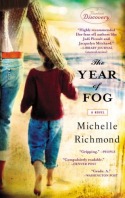
The Year of Fog
by Michelle Richmond
From Publishers Weekly
In this spare page-turner, Richmond (Dream of the Blue Room) draws complex tensions from a the set setup of a child gone missing. Photographer Abby Mason stops on San Francisco's Ocean Beach with her fiancé Jake's six-year-old daughter, Emma, to photograph a seal pup; by the time Abby looks up, Emma has disappeared. Abby, who narrates, flashes back to her growing relationship with high school teacherJake, and sketches its transformation over the course of the search. Emma's mother, Lisbeth (who abandoned the family three years earlier), wants back into Jake's life—even as he is giving up hope on finding Emma. Abby delves into the bereft missing children subculture and into the vagaries of memory. A hypnotist helps Abby unearth promising details of that singular last day with Emma, but the information requires major follow-through from Abby. The book's twist on missing child stories is wholly effective. Richmond develops the principle characters, and Abby's dysfunctional parents make for sharply drawn secondaries, as do local surfers. The book is beautifully paced—one feels Abby's clarity of purpose from the first page. The sure-handed denouement reflects the focus and restraint that Richmond brings to bear througho
From Publishers Weekly
In this spare page-turner, Richmond (Dream of the Blue Room) draws complex tensions from a the set setup of a child gone missing. Photographer Abby Mason stops on San Francisco's Ocean Beach with her fiancé Jake's six-year-old daughter, Emma, to photograph a seal pup; by the time Abby looks up, Emma has disappeared. Abby, who narrates, flashes back to her growing relationship with high school teacherJake, and sketches its transformation over the course of the search. Emma's mother, Lisbeth (who abandoned the family three years earlier), wants back into Jake's life—even as he is giving up hope on finding Emma. Abby delves into the bereft missing children subculture and into the vagaries of memory. A hypnotist helps Abby unearth promising details of that singular last day with Emma, but the information requires major follow-through from Abby. The book's twist on missing child stories is wholly effective. Richmond develops the principle characters, and Abby's dysfunctional parents make for sharply drawn secondaries, as do local surfers. The book is beautifully paced—one feels Abby's clarity of purpose from the first page. The sure-handed denouement reflects the focus and restraint that Richmond brings to bear througho
$
3.00
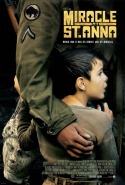
Miracle at St. Anna
by James McBride
From Publishers Weekly
Following the huge critical and commercial success of his nonfiction memoir, The Color of Water, McBride offers a powerful and emotional novel of black American soldiers fighting the German army in the mountains of Italy around the village of St. Anna of Stazzema in December 1944. This is a refreshingly ambitious story of men facing the enemy in front and racial prejudice behind; it is also a carefully crafted tale of a mute Italian orphan boy who teaches the American soldiers, Italian villagers and partisans that miracles are the result of faith and trust. Toward the end of 1944, four black U.S. Army soldiers find themselves trapped behind enemy lines in the village as winter and the German army close in. Pvt. Sam Train, a huge, dim-witted, gentle soldier, cares for the traumatized orphan boy and carries a prized statue's head in a sack on his belt. Train and his three comrades are scared and uncertain what to do next, but an Italian partisan named Peppi involves the Americans in a ruthless ploy to uncover a traitor among the villagers. Someone has betrayed the villagers and local partisans to the Germans, resulting in an unspeakable reprisal. Revenge drives Peppi, but survival drives the Americans. The boy, meanwhile, knows the truth of the atrocity and the identity of the traitor, but he clings to Train for comfort and protection. Through his sharply drawn characters, McBride exposes racism, guilt, courage, revenge and forgiveness, with the soldiers confronting their own fear and rage in surprisingly personal ways at the decisive moment in their live
From Publishers Weekly
Following the huge critical and commercial success of his nonfiction memoir, The Color of Water, McBride offers a powerful and emotional novel of black American soldiers fighting the German army in the mountains of Italy around the village of St. Anna of Stazzema in December 1944. This is a refreshingly ambitious story of men facing the enemy in front and racial prejudice behind; it is also a carefully crafted tale of a mute Italian orphan boy who teaches the American soldiers, Italian villagers and partisans that miracles are the result of faith and trust. Toward the end of 1944, four black U.S. Army soldiers find themselves trapped behind enemy lines in the village as winter and the German army close in. Pvt. Sam Train, a huge, dim-witted, gentle soldier, cares for the traumatized orphan boy and carries a prized statue's head in a sack on his belt. Train and his three comrades are scared and uncertain what to do next, but an Italian partisan named Peppi involves the Americans in a ruthless ploy to uncover a traitor among the villagers. Someone has betrayed the villagers and local partisans to the Germans, resulting in an unspeakable reprisal. Revenge drives Peppi, but survival drives the Americans. The boy, meanwhile, knows the truth of the atrocity and the identity of the traitor, but he clings to Train for comfort and protection. Through his sharply drawn characters, McBride exposes racism, guilt, courage, revenge and forgiveness, with the soldiers confronting their own fear and rage in surprisingly personal ways at the decisive moment in their live
$
2.50
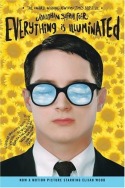
Everything is Illuminated
by Jonathan Safran Foer
Amazon.com Review
he simplest thing would be to describe Everything Is Illuminated, Jonathan Safran Foer's accomplished debut, as a novel about the Holocaust. It is, but that really fails to do justice to the sheer ambition of this book. The main story is a grimly familiar one. A young Jewish American--who just happens to be called Jonathan Safran Foer--travels to the Ukraine in the hope of finding the woman who saved his grandfather from the Nazis. He is aided in his search by Alex Perchov, a naïve Ukrainian translator, Alex's grandfather (also called Alex), and a flatulent mongrel dog named Sammy Davis Jr. Jr. On their journey through Eastern Europe's obliterated landscape they unearth facts about the Nazi atrocities and the extent of Ukrainian complicity that have implications for Perchov as well as Safran Foer. This narrative is not, however, recounted from (the character) Jonathan Safran Foer's perspective. It is relayed through a series of letters that Alex sends to Foer. These are written in the kind of broken Russo-English normally reserved for Bond villains or Latka from Taxi. Interspersed between these letters are fragments of a novel by Safran Foer--a wonderfully imagined, almost magical realist, account of life in the shtetl before the Nazis destroyed it. These are in turn commented on by Alex, creating an additional metafictional angle to the tale.
Amazon.com Review
he simplest thing would be to describe Everything Is Illuminated, Jonathan Safran Foer's accomplished debut, as a novel about the Holocaust. It is, but that really fails to do justice to the sheer ambition of this book. The main story is a grimly familiar one. A young Jewish American--who just happens to be called Jonathan Safran Foer--travels to the Ukraine in the hope of finding the woman who saved his grandfather from the Nazis. He is aided in his search by Alex Perchov, a naïve Ukrainian translator, Alex's grandfather (also called Alex), and a flatulent mongrel dog named Sammy Davis Jr. Jr. On their journey through Eastern Europe's obliterated landscape they unearth facts about the Nazi atrocities and the extent of Ukrainian complicity that have implications for Perchov as well as Safran Foer. This narrative is not, however, recounted from (the character) Jonathan Safran Foer's perspective. It is relayed through a series of letters that Alex sends to Foer. These are written in the kind of broken Russo-English normally reserved for Bond villains or Latka from Taxi. Interspersed between these letters are fragments of a novel by Safran Foer--a wonderfully imagined, almost magical realist, account of life in the shtetl before the Nazis destroyed it. These are in turn commented on by Alex, creating an additional metafictional angle to the tale.
$
3.00
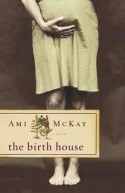
The Birth House
by Ami McKay
From Publishers Weekly
Canadian radiojournalist McKay was unable to ferret out the life story of late midwife Rebecca Steele, who operated a Nova Scotia birthing center out of McKay's Bay of Fundy house in the early 20th century; the result of her unsatisfied curiousity is this debut novel. McKay writes in the voice of shipbuilder's daughter, Dora Rare, "the only daughter in five generations of Rares," who as a girl befriends the elderly and estranged Marie Babineau, long the local midwife (or traiteur), who claims to have marked Dora out from birth as her successor. After initial reluctance and increasingly intensive training, 17-year-old Dora moves in with Marie; on the eve of Dora's marriage to Archer Bigelow, Marie disappears, leaving Dora her practice. A difficult marriage, many difficult births, a patient's baby thrust on her to raise without warning and other crises (including WWI and the introduction of "clinical" birthing methods) ensue. Period advertisments, journal entries and letters to and from various characters give Dora's voice context. The book is more about the texture of Dora's life than plot, and McKay handles the proceedings with winning, unsentimental care.
From Publishers Weekly
Canadian radiojournalist McKay was unable to ferret out the life story of late midwife Rebecca Steele, who operated a Nova Scotia birthing center out of McKay's Bay of Fundy house in the early 20th century; the result of her unsatisfied curiousity is this debut novel. McKay writes in the voice of shipbuilder's daughter, Dora Rare, "the only daughter in five generations of Rares," who as a girl befriends the elderly and estranged Marie Babineau, long the local midwife (or traiteur), who claims to have marked Dora out from birth as her successor. After initial reluctance and increasingly intensive training, 17-year-old Dora moves in with Marie; on the eve of Dora's marriage to Archer Bigelow, Marie disappears, leaving Dora her practice. A difficult marriage, many difficult births, a patient's baby thrust on her to raise without warning and other crises (including WWI and the introduction of "clinical" birthing methods) ensue. Period advertisments, journal entries and letters to and from various characters give Dora's voice context. The book is more about the texture of Dora's life than plot, and McKay handles the proceedings with winning, unsentimental care.
$
3.00
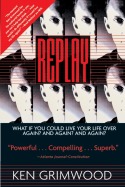
Replay
by Ken Grimwood
From Publishers Weekly
In this intriguing fantasy adventure, Jeff Winston, a failing 43-year-old radio journalist, dies and wakes up in his 18-year-old body in 1963 with his memories of the next 25 years intact. He views the future from the perspective of naive 1963: "null-eyed punks in leather and chains . . . death-beams in orbit around the polluted, choking earth . . . his world sounded like the most nightmarish of science fiction." But Grimwood has transcended genre with this carefully observed, literate and original story. Jeff's knowledge soon becomes as much a curse as a blessing. After recovering from the shock (is the future a dream, or is it real life?), he plays out missed choices. In one life, for example, he falls in love with Pamela, a housewife who died nine minutes after Jeff; they try to warn the world of the disasters it faces, coming in conflict with the government and history. A third replayer turns out to be a serial killer, murdering the same people over and over. Jeff and Pamela are still searching for some missing part of their lives when they notice they are returning closer and closer to the time of their deaths, and realize that the replays and their times together may be coming to an end.
From Publishers Weekly
In this intriguing fantasy adventure, Jeff Winston, a failing 43-year-old radio journalist, dies and wakes up in his 18-year-old body in 1963 with his memories of the next 25 years intact. He views the future from the perspective of naive 1963: "null-eyed punks in leather and chains . . . death-beams in orbit around the polluted, choking earth . . . his world sounded like the most nightmarish of science fiction." But Grimwood has transcended genre with this carefully observed, literate and original story. Jeff's knowledge soon becomes as much a curse as a blessing. After recovering from the shock (is the future a dream, or is it real life?), he plays out missed choices. In one life, for example, he falls in love with Pamela, a housewife who died nine minutes after Jeff; they try to warn the world of the disasters it faces, coming in conflict with the government and history. A third replayer turns out to be a serial killer, murdering the same people over and over. Jeff and Pamela are still searching for some missing part of their lives when they notice they are returning closer and closer to the time of their deaths, and realize that the replays and their times together may be coming to an end.
$
3.00
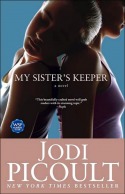
My Sister's Keeper
by Jodi Picoult
From Publishers Weekly
The difficult choices a family must make when a child is diagnosed with a serious disease are explored with pathos and understanding in this 11th novel by Picoult (Second Glance, etc.). The author, who has taken on such controversial subjects as euthanasia (Mercy), teen suicide (The Pact) and sterilization laws (Second Glance), turns her gaze on genetic planning, the prospect of creating babies for health purposes and the ethical and moral fallout that results. Kate Fitzgerald has a rare form of leukemia. Her sister, Anna, was conceived to provide a donor match for procedures that become increasingly invasive. At 13, Anna hires a lawyer so that she can sue her parents for the right to make her own decisions about how her body is used when a kidney transplant is planned. Meanwhile, Jesse, the neglected oldest child of the family, is out setting fires, which his firefighter father, Brian, inevitably puts out. Picoult uses multiple viewpoints to reveal each character's intentions and observations, but she doesn't manage her transitions as gracefully as usual; a series of flashbacks are abrupt. Nor is Sara, the children's mother, as well developed and three-dimensional as previous Picoult protagonists. Her devotion to Kate is understandable, but her complete lack of sympathy for Anna's predicament until the trial does not ring true, nor can we buy that Sara would dust off her law degree and represent herself in such a complicated case. Nevertheless, Picoult ably explores a complex subject with bravado and clarity, and comes up with a heart-wrenching, unexpected plot twist at the book's conclusion.
From Publishers Weekly
The difficult choices a family must make when a child is diagnosed with a serious disease are explored with pathos and understanding in this 11th novel by Picoult (Second Glance, etc.). The author, who has taken on such controversial subjects as euthanasia (Mercy), teen suicide (The Pact) and sterilization laws (Second Glance), turns her gaze on genetic planning, the prospect of creating babies for health purposes and the ethical and moral fallout that results. Kate Fitzgerald has a rare form of leukemia. Her sister, Anna, was conceived to provide a donor match for procedures that become increasingly invasive. At 13, Anna hires a lawyer so that she can sue her parents for the right to make her own decisions about how her body is used when a kidney transplant is planned. Meanwhile, Jesse, the neglected oldest child of the family, is out setting fires, which his firefighter father, Brian, inevitably puts out. Picoult uses multiple viewpoints to reveal each character's intentions and observations, but she doesn't manage her transitions as gracefully as usual; a series of flashbacks are abrupt. Nor is Sara, the children's mother, as well developed and three-dimensional as previous Picoult protagonists. Her devotion to Kate is understandable, but her complete lack of sympathy for Anna's predicament until the trial does not ring true, nor can we buy that Sara would dust off her law degree and represent herself in such a complicated case. Nevertheless, Picoult ably explores a complex subject with bravado and clarity, and comes up with a heart-wrenching, unexpected plot twist at the book's conclusion.
$
3.50
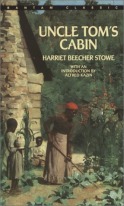
Uncle Tom's Cabin (not actual edition)
by Harriet Beecher Stowe
Uncle Tom's Cabin (1852) - Pious old Uncle Tom is sold by his well-intentioned Kentucy owner Mr Shelby in financial straits. He is bought first by the idealistic Augustine St Clare. In his New Orleans house, Uncle Tom makes friends with St Clare's daughter, the saintly Little Eva, and her black friend, the impish Topsy. 'Never was born!' persisted Topsy... 'never had no father, nor mother, nor nothin'. I was raised by a speculator, with lots of others.' Eva dies in a highly sentimental death scene from a weakened constitution, and St. Clare is killed in an accident. Tom is sold to Simon Legree, a Yankee and a brutal cotton plantation owner. Two of his female slaves pretend to escape and go into hiding. Tom will not reveal their whereabouts and Legree beats the unprotesting Tom to death just before Shelby's son arrives to redeem him. A parallel plot centeres on Eliza, her child, and her husband George who escape to freedom in Canada using the 'underground railroad.' Other important characters are Miss Ophelia St. Clare, a New England spinster, and Marks, the slave catcher.
Uncle Tom's Cabin (1852) - Pious old Uncle Tom is sold by his well-intentioned Kentucy owner Mr Shelby in financial straits. He is bought first by the idealistic Augustine St Clare. In his New Orleans house, Uncle Tom makes friends with St Clare's daughter, the saintly Little Eva, and her black friend, the impish Topsy. 'Never was born!' persisted Topsy... 'never had no father, nor mother, nor nothin'. I was raised by a speculator, with lots of others.' Eva dies in a highly sentimental death scene from a weakened constitution, and St. Clare is killed in an accident. Tom is sold to Simon Legree, a Yankee and a brutal cotton plantation owner. Two of his female slaves pretend to escape and go into hiding. Tom will not reveal their whereabouts and Legree beats the unprotesting Tom to death just before Shelby's son arrives to redeem him. A parallel plot centeres on Eliza, her child, and her husband George who escape to freedom in Canada using the 'underground railroad.' Other important characters are Miss Ophelia St. Clare, a New England spinster, and Marks, the slave catcher.
$
4.00
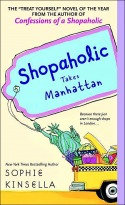
Shopaholic Takes Manhattan
by Sophie Kinsella
From Publishers Weekly
The world is a different place since Helen Fielding triumphed on both sides of the Atlantic, but the torrent of benignly self-indulgent Bridget Jones's Diary knockoffs has not subsided. In this sequel to Kinsella's bestselling Confessions of a Shopaholic, Becky Bloomwood, a personal finance "expert" with her own TV show, is more of a financial mess than ever: she can't stop shopping, even though she can't afford anything. She's even assigned her flatmate, Suze, to monitor her spending, but to no avail: Becky is full of cute rationalizations, like "Foreign money doesn't count, so you can spend as much as you like," and can't stop herself from sneaking into posh boutiques. Her work-obsessed boyfriend, Luke, runs a financial PR agency, and when he gets the green light to open an office in New York City, he brings Becky along. Upon her arrival in the Big Apple, she euphorically discovers Barney's, Saks, Sephora and sample sales but when wind of her shopping excesses gets back to the British press, she loses both her relationship and her TV job. Becky manages to save the day in predictably winning fashion, with plenty of comic moments along the way. Sure, it's tongue-in-cheek and all in good fun but will the barrage of shopping hijinks be enough to hold readers this time around? Kinsella creates some winning characters, but the credit card and shopping bag action is wearing dangerously thin.
From Publishers Weekly
The world is a different place since Helen Fielding triumphed on both sides of the Atlantic, but the torrent of benignly self-indulgent Bridget Jones's Diary knockoffs has not subsided. In this sequel to Kinsella's bestselling Confessions of a Shopaholic, Becky Bloomwood, a personal finance "expert" with her own TV show, is more of a financial mess than ever: she can't stop shopping, even though she can't afford anything. She's even assigned her flatmate, Suze, to monitor her spending, but to no avail: Becky is full of cute rationalizations, like "Foreign money doesn't count, so you can spend as much as you like," and can't stop herself from sneaking into posh boutiques. Her work-obsessed boyfriend, Luke, runs a financial PR agency, and when he gets the green light to open an office in New York City, he brings Becky along. Upon her arrival in the Big Apple, she euphorically discovers Barney's, Saks, Sephora and sample sales but when wind of her shopping excesses gets back to the British press, she loses both her relationship and her TV job. Becky manages to save the day in predictably winning fashion, with plenty of comic moments along the way. Sure, it's tongue-in-cheek and all in good fun but will the barrage of shopping hijinks be enough to hold readers this time around? Kinsella creates some winning characters, but the credit card and shopping bag action is wearing dangerously thin.
$
3.50

By the Shore
by Galaxy Craze
Amazon.com Review
Twelve is a dreadful age for almost any girl, with its nonstop insecurity and humiliation. But May, the heroine of Galaxy Craze's By the Shore, seems to suffer considerably more than her share of unhappiness. Ignored by the popular clique at school, dressed by her mother in retro-hippie fashions that are anything but cool, she's a virtual poster child for preteen angst. And if adolescence weren't enough of a burden, May must also contend with a big dose of familial angst. Her mother, Lucy, runs a none-too-successful guesthouse on the English coast. Young and single, she spends more time gossiping and party hopping than tending to May and her brother Eden. And this distracted maternal style has, alas, exposed our heroine to machinations of grown-up life, which she tracks with fascination and horror. Her single remaining pocket of naiveté involves her estranged father, whose return she eagerly anticipates--even after an unassuming writer begins to pay court to her swinging mom. But this dream, too, is crushed when the genuine item shows up: "This is what happens to hope: it gets smaller and smaller."By the Shore does contain some of the typical properties of a coming-of-age drama. But Craze, a first-time novelist and actress, writes with acute insight and sympathy, and she understands one of the great consolations of adolescence: that even the tiniest kernel of hope can be enough to generate almost boundless happiness.
Amazon.com Review
Twelve is a dreadful age for almost any girl, with its nonstop insecurity and humiliation. But May, the heroine of Galaxy Craze's By the Shore, seems to suffer considerably more than her share of unhappiness. Ignored by the popular clique at school, dressed by her mother in retro-hippie fashions that are anything but cool, she's a virtual poster child for preteen angst. And if adolescence weren't enough of a burden, May must also contend with a big dose of familial angst. Her mother, Lucy, runs a none-too-successful guesthouse on the English coast. Young and single, she spends more time gossiping and party hopping than tending to May and her brother Eden. And this distracted maternal style has, alas, exposed our heroine to machinations of grown-up life, which she tracks with fascination and horror. Her single remaining pocket of naiveté involves her estranged father, whose return she eagerly anticipates--even after an unassuming writer begins to pay court to her swinging mom. But this dream, too, is crushed when the genuine item shows up: "This is what happens to hope: it gets smaller and smaller."By the Shore does contain some of the typical properties of a coming-of-age drama. But Craze, a first-time novelist and actress, writes with acute insight and sympathy, and she understands one of the great consolations of adolescence: that even the tiniest kernel of hope can be enough to generate almost boundless happiness.
$
2.00
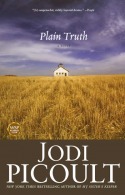
Plain Truth
by Jodi Picoult
From Publishers Weekly
Though it begins as the quietly electrifying story of an unmarried Amish teenager who gives birth to a baby she is accused of then smothering, Picoult's latest (after Keeping Faith) settles into an ordinary trial epic, albeit one centered intriguingly on an Amish dairy farm near Lancaster, Pa. Katie Fisher, 18, denies not only having committed the murder but even having borne the baby, whose body is found in the Fishers' calving pen, and she sticks to her story, even when she is quizzed by Ellie Hathaway, the high-powered Philadelphia attorney who undertakes Katie's defense as a favor to Leda, an aunt she and the young woman share. Ellie, who has retreated to Leda's farm in Paradise to reconsider her life--she successfully defends guilty clients--embarks on the case reluctantly: at 39, she wants nothing more than to have a child. However, to meet bail stipulations, she volunteers as Katie's guardian (since Kate's strict parents reject her) and moves in with the Fishers. Living with the Amish necessitates some adjustments for both parties, but Katie and Ellie become fast friends in spite of their differences. Very little action occurs beyond the initial setup, though the questions remain: Who was the father of Katie's child? And did she smother the newborn? Told from both third-person omniscient and first-person (Ellie's) vantages, the story rolls leisurely through the trial preparations, the results of which are repeated, tediously, in the courtroom. Perhaps the story's quietude is appropriate, given its magnificently painted backdrop and distinctive characters, but one can't help wishing that the spark igniting the book's opening pages had built into a full-fledged blaze.
From Publishers Weekly
Though it begins as the quietly electrifying story of an unmarried Amish teenager who gives birth to a baby she is accused of then smothering, Picoult's latest (after Keeping Faith) settles into an ordinary trial epic, albeit one centered intriguingly on an Amish dairy farm near Lancaster, Pa. Katie Fisher, 18, denies not only having committed the murder but even having borne the baby, whose body is found in the Fishers' calving pen, and she sticks to her story, even when she is quizzed by Ellie Hathaway, the high-powered Philadelphia attorney who undertakes Katie's defense as a favor to Leda, an aunt she and the young woman share. Ellie, who has retreated to Leda's farm in Paradise to reconsider her life--she successfully defends guilty clients--embarks on the case reluctantly: at 39, she wants nothing more than to have a child. However, to meet bail stipulations, she volunteers as Katie's guardian (since Kate's strict parents reject her) and moves in with the Fishers. Living with the Amish necessitates some adjustments for both parties, but Katie and Ellie become fast friends in spite of their differences. Very little action occurs beyond the initial setup, though the questions remain: Who was the father of Katie's child? And did she smother the newborn? Told from both third-person omniscient and first-person (Ellie's) vantages, the story rolls leisurely through the trial preparations, the results of which are repeated, tediously, in the courtroom. Perhaps the story's quietude is appropriate, given its magnificently painted backdrop and distinctive characters, but one can't help wishing that the spark igniting the book's opening pages had built into a full-fledged blaze.
$
3.50
